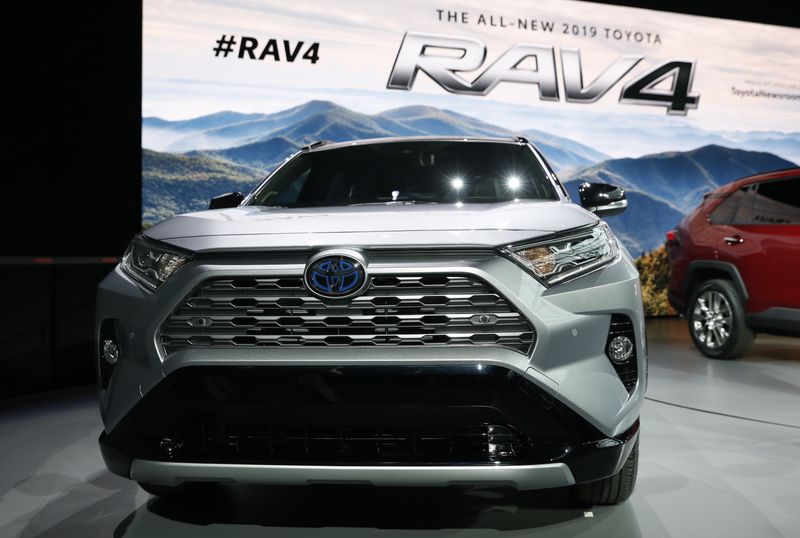By Daniel Leussink and Abhirup Roy
TOKYO/SAN FRANCISCO (Reuters) -When Tony Le set out with his wife to buy a new car last year, he looked at Tesla (NASDAQ:TSLA) and other all-electric models.
In the end, the 37-year-old Modesto, California, tech worker opted for a Toyota RAV4 Hybrid due to worries over getting stranded with a purely electric vehicle, a dead battery and no charging station in sight.
"Sometimes I want to play with the electric vehicles just based on the speed and torque. But for practical use ... it just didn't make sense," said Le, who often drives to Washington state from California for work.
Le is among the growing number of consumers accelerating hybrid vehicle sales, leaving long-time hybrid maker Toyota Motor (NYSE:TM) in pole position to lap rivals who have been making a rapid transition towards full electrification and now grapple with weakening EV demand.
High interest rates and an uncertain economic outlook have also prompted many EV makers to cut their production targets and warn of slowing sales growth in recent weeks.
Toyota, however, is expected to offer a more upbeat outlook when it reports its earnings on Tuesday, helped by its heavy reliance on hybrids, which accounted for around one third of its total sales of more than 10 million vehicles last year.
"Pretty much every model we sell now is either exclusively hybrid or has a hybrid variant," Greg Davis, general manager of Walser Toyota, a dealership in Minnesota, told Reuters.
He said his outlet is trying to get the number of hybrid vehicles it sells up to 40%-50% of total sales, as Toyota moves to make its best-selling sedan in the U.S. market, the Camry, available only in a hybrid version.
Toyota has already said the next generation of the Camry will come only as a hybrid, its boldest move yet to push the technology it pioneered with the Prius, introduced more than a quarter century ago.
Despite the near-term sales boost Toyota is expected to report, analysts warn a major risk facing the world's top-selling carmaker is that it remains a laggard in pure battery EVs, which are widely viewed as making up the long-term future of the auto industry.
"Toyota's biggest risk is about consumer adoption of BEVs (battery EVs)," said Stephanie Brinley, an associate director at S&P Global Mobility.
"If consumer adoption of BEVs shifts again and speeds up, Toyota may not be fully ready with competitive BEV solutions."
Toyota sold just 104,000 battery EVs last year, less than 1% of its total sales, including of its luxury Lexus brand. It plans to boost shipments to 1.5 million EVs by 2026, below Tesla's 2023 shipments of 1.8 million vehicles.
Toyota takes a "multi-pathway" approach to satisfying customer needs in every market, and Chairman Akio Toyoda said last month that battery EVs would reach a market share of 30% at most, with hybrids, hydrogen fuel-cell cars and fuel-burning vehicles making up the rest.
LONG WAITS FOR DELIVERIES
U.S. hybrid sales have been rising as consumers balk at high EV prices and are anxious about the range of electric cars, especially in more rural areas, where there could be long distances between charging stations.
Battery EVs are not as widely accepted in the Midwest as they are on the West Coast and other parts of the United States, Davis said.
But demand for hybrids is so strong that buyers have to wait for about a year to get deliveries of some models such as the Toyota Sienna multi-purpose vehicle, and pay full manufacturer-suggested retail prices, he said.
In stark contrast, Tesla, which has been offering sharp price cuts since last year in major markets including the U.S. and China, suffered a vehicle margin reduction last quarter and warned of slowing EV demand this year.
Hybrids accounted for 9.3% of new light vehicle registrations in the United States from January to November in 2023, outstripping those of EVs by 1.8 percentage points, according to S&P Global Mobility data.
That is benefiting Toyota, which was the biggest hybrid seller in the U.S. with more than one third of the new registrations, followed by Honda (NYSE:HMC) Motor with 20%, South Korea's Hyundai Motor (OTC:HYMTF) and its affiliate Kia, and Ford Motor (NYSE:F).
General Motors (NYSE:GM) CEO Mary Barra said this week her company will roll out plug-in hybrid vehicles in North America, pivoting away from a strategy of bypassing hybrid powertrains on that continent.
Analysts expect Toyota to post a 40% rise in October-December operating profit, according to LSEG data.
